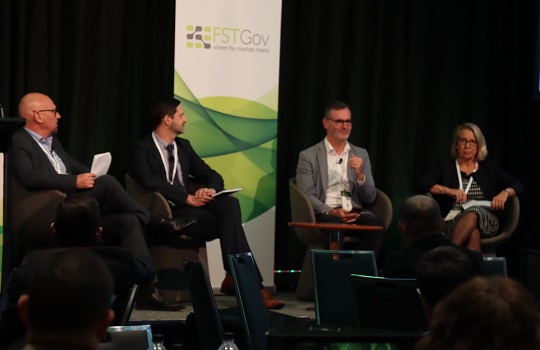
Governments need greater dynamism and constant iteration of their information governance management frameworks, as well as greater cross-agency alignment in data standards, in order to keep pace with agencies’ rapidly evolving digital ecosystems, according to panellists at the FST Government Western Australia 2022 conference.
Peter Hullett, assistant director, enterprise information management, at WA’s Department of Finance, acknowledged that the exponential growth and turnover of data assets within government technology systems, alongside the continuous adoption of new digital technologies, mean that “static” data management frameworks are ill-suited to government information systems.
He stressed the need for “dynamic” information governance frameworks that are able to effectively “catch up” with government agencies’ fast-changing digital ecosystems.
The National Archives of Australia defines an information governance framework as a “structure that provides a holistic overview of the influences that inform how an organisation creates and manages its enterprise-wide information assets (records, information and data)”. These frameworks are critical to ensuring data is not only accessible and readable, but also that it meets key legislative and regulatory requirements.
Such frameworks are, in Hullett’s view, as important as the “artefacts” (i.e. the software and hardware systems that transforms raw data into useable information assets) that populate them, vital to ensuring that any data received from a client agency comes in the right format and is of optimal quality.
Frameworks, he argued, also need to be “road-tested” with agencies and any other data providers to ensure their compliance with these standards.
As an example, Hullett cited a current data asset model developed at the Department of Finance that aimed to support asset-related decision-making across government.
He said this data model would not only help the Department understand the current maintenance and repair state of the WA Government’s digital assets, but also where those assets were located.
A key problem for agencies has been the increasing diversification of services, with new functions and data now crossing multiple departments (accelerated through the adoption of cloud) rather than sitting within a single team and single mainframe. As a result, Hullett said, information governance frameworks need greater flexibility to “bring it all together”.
“From my perspective, [the frameworks] have to be constantly iterated to account for different environments. But, also, the things that exist within the framework have to be kept alive too because the environment is not static,” Hullett noted.
On the point of modernising governance frameworks, Damian Shepherd, director, state records at the State Records Office of Western Australia, said his office was currently working on a framework for Western Australia. He extended an invitation to fellow WA agencies to join in the development of these frameworks over the coming months.
Speaking on the value and purpose of the Records Office’s information governance framework, he said: “The main idea is that we want to develop something that helps map our way across and something we can perhaps share with our directors generals or chief information officers or anyone else within the organisation that provides some pathway across governance.”
Shepherd pointed to New South Wales, Victoria and the Department of Health in Western Australia as good examples for other agencies in WA to follow in developing their own (or a cross-agency) governance frameworks.
“We want to leverage that experience and develop something that is easy for people to understand, something that we can maintain without too much effort into the future, but ultimately to have that goal of making it easy to navigate our way across that information governance landscape.”
On a separate note, addressing responsible and secure cross-agency data sharing, Catherine Fletcher, Information Commissioner at the Office of the Information Commissioner, said she hoped WA’s upcoming privacy legislation would provide not only opportunities to educate agencies about “good privacy practices” but also remedies for organisations in cases when privacy practices were “not so great”.
Further to that, she urged for privacy legislation covering responsible information sharing to grant the regulator full powers to both educate and carry out enforcement action.
Fletcher stressed that agencies should compel their people to “champion good data sharing” and “lead their agencies in the spirit of good information-sharing practices” under the Freedom of Information Act.
“The whole point of making government data and information available is so the government is accountable and also enables citizens to participate.
“They are the principles of the Freedom of Information Act which I think are really enduring and they very much need to be applied in the data context,” she concluded.





